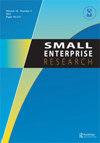Machine learning for predictive model in entrepreneurship research: predicting entrepreneurial action
IF 1.8
Q3 BUSINESS
引用次数: 0
Abstract
ABSTRACT This study introduces a method for developing predictive models using machine learning in entrepreneurship research. Machine learning is known to provide a superior performance of prediction by identifying hidden patterns in data through an inductive approach. However, there are very few studies adopting this methodology in social sciences, especially in the field of entrepreneurship. This study investigates the utility of machine learning in entrepreneurship research and proposes a practical method to develop a predictive model using machine learning. For the implementation of this method, as a case study, this study builds a model that predicts entrepreneurial action based on data from the Global Entrepreneurship Monitor (GEM). This study compares the performance of machine learning such as XG boost and artificial neural network (ANN) with traditional statistical method, logistic regression model. Performance indicators such as accuracy, sensitivity, specificity, and area under curve (AUC) were used for evaluation. XG boost showed the highest performance in all indicators except for precision. In the analysis of the variable importance, self-efficacy and opportunity are the most influential factors for predicting entrepreneurial action.创业研究中预测模型的机器学习:预测创业行为
本文介绍了一种在创业研究中使用机器学习开发预测模型的方法。众所周知,机器学习通过归纳方法识别数据中的隐藏模式,从而提供卓越的预测性能。然而,在社会科学领域,特别是在创业领域,很少有研究采用这种方法。本研究探讨了机器学习在创业研究中的效用,并提出了一种利用机器学习开发预测模型的实用方法。为了实施这一方法,作为案例研究,本研究基于全球创业监测(GEM)的数据构建了一个预测创业行为的模型。本研究比较了XG boost和人工神经网络(ANN)等机器学习方法与传统统计方法、逻辑回归模型的性能。采用准确性、灵敏度、特异性、曲线下面积(AUC)等性能指标进行评价。除精度外,XG boost在所有指标中都表现出最高的性能。在变量重要性分析中,自我效能感和机会是预测创业行为的最重要因素。
本文章由计算机程序翻译,如有差异,请以英文原文为准。
求助全文
约1分钟内获得全文
求助全文

 求助内容:
求助内容: 应助结果提醒方式:
应助结果提醒方式:


